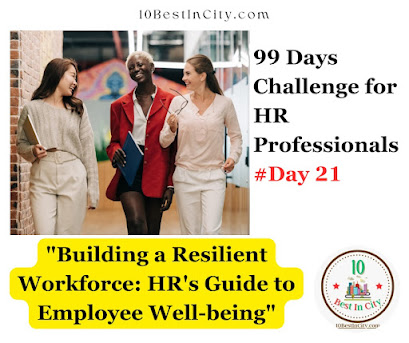99 Days Challenge for HR Professionals #Day 21
"Building a Resilient Workforce: HR's Guide to Employee Well-being"
In the dynamic and ever-evolving landscape of the modern workplace, the concept of employee well-being has transcended mere physical health to encompass a holistic approach that considers mental, emotional, and social aspects. As organizations recognize the intrinsic link between employee well-being and overall performance, Human Resources (HR) professionals find themselves at the forefront of initiatives aimed at building a resilient workforce. This article explores the multifaceted role of HR in shaping a workplace environment that prioritizes employee well-being, resilience, and overall job satisfaction.
Understanding Employee Well-being:
1. Holistic Approach:
Employee well-being goes beyond traditional health metrics. HR professionals are encouraged to adopt a holistic approach, considering factors such as work-life balance, mental health, and emotional fulfillment. This comprehensive perspective acknowledges that employees are individuals with diverse needs and aspirations.
2. Workplace Culture:
The organizational culture forms the bedrock of employee well-being. A positive and inclusive culture fosters a sense of belonging, encouraging employees to bring their authentic selves to work. A workplace where employees feel valued and supported contributes significantly to their overall well-being.
3. Flexibility and Adaptability:
In an era of changing work paradigms, flexibility is a cornerstone of employee well-being. HR should champion policies that allow for flexible work arrangements, acknowledging the diverse needs of the workforce. This includes remote work options, flexible schedules, and adaptive work environments.
HR Strategies for Employee Well-being:
1. Wellness Programs:
Implementing robust wellness programs is a strategic imperative for HR. These programs can encompass physical fitness initiatives, mental health support services, nutritional guidance, and initiatives that promote overall well-being. HR becomes instrumental in sourcing and curating programs that resonate with the workforce.
2. Mental Health Support:
Recognizing the significance of mental health, HR plays a pivotal role in establishing support systems. Employee Assistance Programs (EAPs), mental health days, and cultivating an open dialogue about mental health contribute to creating a workplace that prioritizes emotional well-being.
3. Training and Development:
Investing in the continuous learning and development of employees is a testament to an organization's commitment to their well-being. HR initiatives should focus on providing opportunities for skill enhancement, career growth, and personal development, creating a sense of purpose and accomplishment.
4. Work-Life Balance Initiatives:
Encouraging a healthy work-life balance is crucial for HR professionals. By developing and implementing policies that discourage overworking, promote reasonable workload expectations, and establish clear boundaries for off-hours communication, HR supports an environment where employees can thrive both professionally and personally.
5. Flexible Work Arrangements:
HR is instrumental in championing flexible work arrangements. Offering options such as remote work or flexible schedules provides employees with the autonomy to manage their work in a way that aligns with their individual needs, reducing stress and enhancing overall well-being.
6. Recognition and Feedback:
Regularly recognizing and providing constructive feedback to employees contribute to their sense of accomplishment and job satisfaction. HR facilitates a culture where contributions are acknowledged, fostering a positive work environment.
7. Inclusive Policies:
HR policies must be inclusive, recognizing and accommodating diverse needs. This includes considerations for different family structures, cultural backgrounds, and personal circumstances. HR ensures that policies promote fairness, equity, and inclusivity.
Nurturing Resilience in the Workforce:
1. Adaptive Leadership:
HR plays a crucial role in fostering adaptive leadership within the organization. This involves preparing leaders to navigate challenges, fostering a culture of resilience, and promoting a growth mindset that views setbacks as opportunities for learning and improvement.
2. Crisis Response Planning:
HR is at the forefront of developing and implementing crisis response plans. Whether dealing with personal, organizational, or global crises, having well-defined strategies to support employees during challenging times is essential.
3. Communication and Transparency:
Effective communication is the bedrock of trust. HR ensures open communication channels and provides transparent information about organizational changes and developments. Clear and transparent communication fosters a sense of security among employees.
4. Community and Connection:
HR facilitates initiatives that build a sense of community among employees. This includes team-building activities, mentorship programs, and initiatives that encourage social interaction. A connected workforce is more resilient in the face of challenges.
5. Learning from Adversity:
Encouraging a mindset that sees challenges as opportunities for growth is a key aspect of HR's role. HR promotes a culture that learns from adversity, adapts to change, and embraces innovation. This mindset contributes to overall organizational resilience.
HR professionals emerge as architects of a positive work culture that prioritizes employee well-being and resilience. By implementing strategies that consider the holistic needs of employees, fostering resilience, and adapting to the evolving nature of work, HR plays a pivotal role in creating an environment where employees can thrive both personally and professionally. The benefits extend beyond individual well-being to impact team dynamics, organizational performance, and the overall success of the enterprise in a rapidly changing world.
Kajol Kapura Soren
HR Head
10BestInCity.com
Kajol@10BestInCity.com
+91 73966 64394
https://kajolkapurasoren.vcardinfo.com
Facebook:
https://www.facebook.com/kapurakajol
Instagram:
https://www.instagram.com/kajolsoren
Linkedin:
https://www.linkedin.com/in/kajols
Pinterest:
https://in.pinterest.com/kajolks14
Twitter:
https://twitter.com/KajolSoren4
Quora:
https://www.quora.com/profile/Kajol-Soren
V Card :
https://kajolkapurasoren.vcardinfo.com
Bio:
https://www.portrait-business-woman.com/2023/07/kajol-kapura-head-hr-10bestincitycom.html



.jpeg)